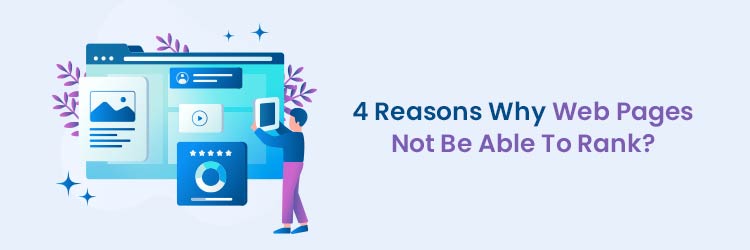4 Reasons Why Web Pages Not Be Able To Rank?

Business owners and marketers often wonder why their website fails to rank well in Google despite efforts like content building, backlinks, and on-page optimization. The search engine algorithm considers many nuanced factors in deciding which pages perform best for a query.
In a recent video, Google’s Search Liaison Martin Splitt outlined four key reasons preventing a webpage from ranking – content, technical, authority, and promotion issues. Let’s examine these factors and how to diagnose and fix them to improve search visibility.
Also Read:- Google Introduces A New Local Pack Ranking Factor For 2024
Table of Contents
1. Content Issues
The first area Splitt highlights is problems with the actual content on the page – perhaps the most fundamental factor for optimizing pages to rank. Some key content-related issues that could hurt rankings are:
- Thin, unhelpful content – Lacking depth, helpful information, or poorly answering the search intent.
- Over-optimization – Stuffing in keywords and awkward phrasing in an unnatural attempt to chase the algorithm.
- Low-value content – Generic, boilerplate content without unique value addition for users.
- Plagiarized or scraped content – Duplicate content issues hurt rankings.
- Targeting wrong keywords – Misunderstanding user search intent leads to targeting unrelated terms.
- Bad formatting – Walls of text, distracting ads, pop-ups, and other poor formatting that hurts readability.
To diagnose content issues, analyze your top-performing competitors and what value their content offers to searchers. Refine your content and keywords accordingly.
2. Technical Issues
Even if your content is solid, technical problems like site speed, infrastructure, and tagging errors can hamper rankings and user experience:
- Slow load times – Bulky images, lack of caching, and unoptimized code leads to slow load speeds.
- Mobile optimization problems – Improper responsiveness, sizing, and touch target sizes hurt mobile UX.
- Incorrect headers and tags – Missing H1 and title tags, improper headings structure, thin page titles.
- Indexing errors – Crawl budget limitations, restrictions via robots.txt, or page fetch errors prevent indexing.
- Site architecture issues – Deep nesting, overlapping content, and broken navigation negatively impact crawler ability and UX.
Diagnosing technical SEO requires in-depth analysis using tools like Google Search Console, PageSpeed Insights, ScreamingFrog, etc.
3. Authority Issues
Search engines also consider metrics related to reputation and authority to evaluate a page’s topical expertise:
- Domain Authority – The trust of a website based on its backlink profile, traffic, brand visibility, etc.
- Page Authority – The relative authority of each page on a site based on internal links and engagement metrics.
- Click-Through-Rates – The CTR of a page in results indicates its ability to satisfy searchers.
- Dwell Time – How long searchers stay on a page signals relevance. Bouncebacks hurt.
- Brand Signals – Mentions, links, verified profiles, and real-world reputation improve authority.
Focus on high-quality backlinks, brand-building efforts, and churning out authoritative content to boost metrics over time.
4. Promotion Issues
The final aspect is improving visibility and reach through promotion:
- Lack of backlinks – Minimal external links and mentions limit a page’s discoverability.
- Not socialized – Pages need social shares and engagement on public platforms.
- Poor internal linking – Optimizing interlinking from other pages on the same site improves crawlability.
- Not suggested – Leverage Google Discover and other recommendation platforms.
- Limited search volume – Targeting ultra-long-tail keywords with no search volume.
External and internally promoting content on your site facilitates discovery by search bots and users. Measure potential search volume before targeting keywords.
By examining these four key ranking factors – content, technical, authority, and promotion – you can diagnose which issues may limit your web page’s search performance. Addressing the underlying problems helps pages gradually gain visibility and start ranking for valuable search queries.
FACT TIME!
Did you know that 73% of people prefer website information to other sources? Compared to other online sources, most people trust the information they discover on a business website. This means more consumers will eventually base their purchasing decisions on what they see and read on legitimate business websites.

Smart Dent
Manish Sharma is a fantastic website developer who knows how to turn your vision into reality. He worked with me on a project that required a lot of customization and functionality, and he nailed it. He was always available to answer my questions.
Considering my background with no computer-based knowledge, the whole process was made seamless for my Australian-based business. I would recommend Manish and his team.
Recent Blogs
-
 11 Powerful Digital Marketing For Travel Agency Strategies
11 Powerful Digital Marketing For Travel Agency Strategies
-
 Struggling with Leads? A Digital Marketing Agency Dallas Can Fix That
Struggling with Leads? A Digital Marketing Agency Dallas Can Fix That
-
 SEO Services Los Angeles Horror Stories: Costly Mistakes That Hurt Businesses
SEO Services Los Angeles Horror Stories: Costly Mistakes That Hurt Businesses
-
 How to Future-Proof Your Brand Identity for Long-term Success with a Digital Marketing Agency Washington DC
How to Future-Proof Your Brand Identity for Long-term Success with a Digital Marketing Agency Washington DC
-
 How to Create a Winning Digital Strategy with a Digital Marketing Agency New York
How to Create a Winning Digital Strategy with a Digital Marketing Agency New York


